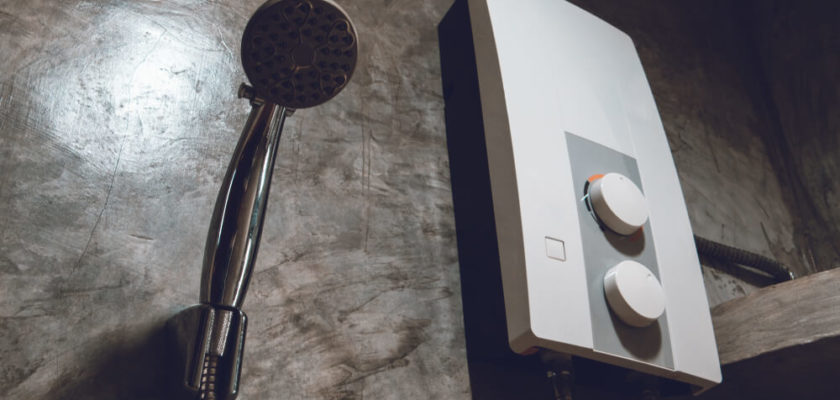If you’re still trying to decide whether to switch to an electric tankless water heater for your home, office, or workshop, then buckle up and read on! First off, the best electric tankless water heater will definitely save you money; it has many other benefits as well, but here are a few things you’ll want to consider before swapping out your time-tested water heater.
Different electric tankless water heaters give you different options and features, and each one brings a whole set of pros and cons to the table. After reviewing each of these tankless water heaters top of the list, we’ve included a brief buyer’s guide with everything that you'll need to take note of that makes up an efficient tankless water heater.
Everything from the heating type, installation, output temperature capacity, flow rate, controls, and others, to help you make a more informed purchase.
Overall, a tankless heater will save you space, offer you much more energy efficiency compared to the conventional water heaters, and most of all, you'll never run out of hot water since no storage tank is going to deplete.
Contents
The Best Electric Tankless Water Heater
1. Stiebel Eltron Tempra 12+ Tankless Water Heater
- CONTINUOUS FLOW – Advanced Flow Control...
- SPACE & ENERGY SAVER – Its small, sleek...
- EASY OPERATION – Electronic switch...
- TEMPRA 12 PLUS – This specific model is...
- WARRANTIES INCLUDED – Stiebel Eltron’s...
Overall, the Stiebel Eltron Tempra 12+ tankless water heater ranks as the best tankless water heater in the market currently. It is easy to operate and even features a digital display for convenience. Its advanced flow control technology helps reduce water flow on a continuous flow system, especially if the demand for heating water is high.
It comes in a compact size that can fit in whatever space in your home. It’s also so quiet that you'll hardly ever notice it running. It has the capacity to give a temperature rise of water to 140 degrees Fahrenheit, depending on how much it is as well. The only real downside you may experience with Stiebel Eltron Tempra 12+ tankless water heater is the added cost to install if your water source is not close to where the wiring is.
Pros
Cons
2. Titan SCR2 N-120 Electric Tankless Water Heater
- Tankless Water Heater
The Titan SCR2 N-120 tankless water heater is the best budget pick for an electric tankless water heater worth every penny. It is generally inexpensive and easy to install, especially if the heater is close to your electrical panel.
It is easy to understand and with only two simple control buttons to adjust its water temperature. To help conserve energy and cut energy costs, it only turns on once it detects the water is moving through it, so the energy savings are big.
The downside to the Titan SCR2 N-120 tankless water heater is that it has a very slow flow rate that can take a while to fill the bathtub. In the first few minutes, the temperature fluctuates as well.
Pros
Cons
3. Sio Green SIO18 Electric Tankless Water Heater
The Sio Green SIO18 heater is the premium choice. It's a bit more expensive than most electric systems, but it features a unique infrared heating system that doesn't need the coils to heat water. Since no water passes over the coils, there are no mineral deposits or corrosion. Therefore, there is no need to flush out your system or change the coils, making these electric tankless water heaters maintenance-free.
It’s easy to read, install, and set its digital display to maintain water temperature.
The only real downside is that it takes a while to produce hot water compared to the coil heaters. Also, if you live in cold weather climates, it struggles to deliver hot water showers during the winter consistently. Another minor problem is that the connections are specifically meant for the UK. While they may fit US fixtures, you may experience some leakages and require the use of additional rubber washers.
Pros
Cons
4. Ecosmart ECO 18 Electric Tankless Water Heater
- The product is highly durable
- The product is easy to use
- Manufactured in China
- Amperage (amps): 75. Activation flow: 0. 3...
- The product works and is compatible with 2 X...
The Ecosmart ECO 18 heater is small, durable, and easy to install. It’s easy to use and features a knob for temperature control. The self-modulating technology automatically helps controls the unit, so you can only use the power you need. It comes with 3 heating elements too, but you don’t need all three.
If you have hard water, the copper coils corrode much more quickly and will often need replacing, which adds up to a higher cost. Each of these heating elements also requires a spot in the electrical box, so it might use a lot of power if all the 3 coils are actively operating.
Pros
Cons
5. ECOTOUCH Electric Tankless Water Heater
- The product is highly durable
- The product is easy to use
- Manufactured in China
- Amperage (amps): 75. Activation flow: 0. 3...
- The product works and is compatible with 2 X...
The ECOTOUCH electric heat exchanger is a compact unit that quickly heats water to 116 degrees. It can automatically adjust the power use based on the flow rate, consequently which helps you save power even when in use. Its touch control panel and digital display are easy to read and use and even include a remote control.
In warmer climates with an outside temperature of 67-degree Fahrenheit or above, this hot water heater can provide hot water at a flow rate of up to 2 gallons per minute (GPM). It can be used for multiple hot water supplies or just a single application based on what you need.
This robust internal water heater can sufficiently provide hot water to two sinks and one shower simultaneously. Meaning a person can heat water to take a shower while the other person uses 2 pans simultaneously without losing hot water.
The downside is that it's not powerful enough for hot water demands on showers and can only be used on sinks. It also requires professional installation.
Pros
Cons
Factors to Consider for the Best Electric Tankless Water Heater
A) Size
When choosing an electric tankless heater, naturally, the first thing you should look at is the size. The size here means how much hot water your tankless system can heat. Some electric water heaters have a single-point operation, meaning they will heat the water at a single location, making them great for the office or workshop.
Unfortunately, they are of little to no use in a household with more than 1 bathroom, a washing machine, and several people living there who take showers every day. In cold climates, and for households, you will need large amounts of hot water and would best use a whole house water heater.
B) The Heating Method
The most common heating method in an electric tankless water heater is by moving the water through its copper heating elements. As the water is passing through the electrically heated copper coils, it gets heated. The more coils your tankless unit has, the more the heating power and the more the amount of water being heated.
The second way a tankless electric water heater heats water is by using infrared technology. These water heaters are usually much more expensive than the conventional water heater that uses a copper coil. On the other hand, it doesn’t rust with hard minerals, which can last much longer. However, these electric water heaters do not perform nearly as well as the copper tankless water heaters.
C) Installation
Installation is always a major concern. Most of the tankless electric water heater units on this list are easy to install and require minimal effort. The tricky part comes in when you need to connect the heater to the circuit breaker. Many people here opt for professional assistance, which means a few extra dollars added to the total cost.
Another consideration is the distance between the electric heater and the hot water faucet, where the water is needed. A longer piping hot water distance always puts more strain on tankless water heaters as the system tries to keep the incoming water temperature hot as it travels through the water pipes.
For energy efficiency, a longer distance may require a stronger energy-efficient heater. However, these electric water heaters require additional insulation, which is also an increase in the overall cost.
Frequently Asked Questions on the Best Electric Tankless Water Heater
1. What are the benefits of using electric tankless water heaters?
- Electric tankless water heaters are huge energy savers since only the amount required is heated
- They come in a compact size that perfectly fits anywhere, even under the sink, unlike a traditional water heater that can be quite large.
- You get constant hot water because it is all heated when needed, compared to the traditional water heater that usually stores a limited amount of water that can also run out
- You get fresher water since it’s never idly sitting in the tank
- These tankless heaters have more serviceable parts compared to the traditional heater
2. What are the cons of having a tankless water heater?
Although electric tankless water heaters take up little space, have an on-demand hot water supply, have a much lower risk of having leaks, are much safer for households, and have a significantly much longer lifespan compared to their traditional counterparts, their main disadvantage is their upfront cost. The cost of the unit and its installation is relatively higher than a tank water heater.
Also Read:
- None Found





